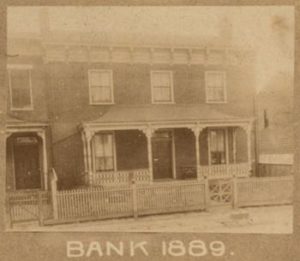
True Reformers Bank
*On this date in 1881, we mark the founding of The Grand Fountain United Order of True Reformers (GFUOTR). This was a Fraternal Organization of African Americans based in Richmond, Virginia, during Reconstruction.
Their purpose was to set up a business and social opportunities in which Negroes could become active. By covering the lives of these members, several of these social orders became wealthy businesses. These organizations began to sell Negroes insurance when white companies refused. Its founder was William Washington Browne, a Methodist Minister from Georgia. After the American Civil War, alongside the misconceptions that Blacks were inferior, Self Help Organizations sprang up after the Civil War to address the needs of the newly freed slaves. One of the most successful in the first half of the 20th century was the GFUOTR.
Originally, the Grand United Order of True Reformers began in 1873 as a fraternal society for African Americans in Alabama and Kentucky. Deputies of the all-white, pro-temperance organization, the Independent Order of Good Templars, managed it to a large extent. William Washington Browne, an African American who spoke passionately against "king alcohol," tried to apply for formal membership to the Good Templars but was denied because of his race. When the Good Templars agreed to foster a separate all-black affiliate group called the United Order of True Reformers, Browne accepted this level of support.
Although Browne did not start the True Reformers, he eventually transformed the order into a mutual benefit association. He broadened the organization's membership by traveling throughout the South, building smaller chapters or "sub-fountains" while preaching temperance. From Browne's perspective, alcohol and drunkenness were the primary causes for the disproportionate numbers of blacks in penitentiaries and, because convicts were denied the right to vote, the main reasons that so much of the black community had been disfranchised.
GRUOTR was created with a renewed purpose and energy out of the languishing Grand United Order of True Reformers, which began in the 1870s in Alabama and Kentucky. Where the original order taught temperance and provided members with sick and death benefits, Browne's vision expanded into an enterprise that cultivated a growing black middle class by offering services that included a savings bank, a real estate company, a retirement home, and a youth and children's division that taught discipline, thrift, and business skills. He set up a GFUOTR, so Blacks could join and gain more benefits. At the time, W.E.B. Du Bois characterized Browne's Fraternal Organization as "Probably the most remarkable Negro organization in the country."
The business network created by the True Reformers fell apart in 1910. That year it was discovered that the cashier of the Reformers Savings Bank had embezzled more than $50,000 from member deposits. This scandal became public at the same time that several businesses defaulted on a series of large unsecured loans, leaving the True Reformers unable to pay insurance claims. The Virginia State Corporation Commission closed the bank on October 20, 1910, leading to the collapse of most of True Reformer's other ventures largely because they were all tied to the bank as their financial core.
The order continued to serve as a fraternal organization and provide insurance benefits until 1934, when its name disappeared from the Virginia State Corporation Commission's records. In 1989, the True Reformer building in Washington, D.C., was placed on the National Historic Register. Today’s Black Entrepreneurs would study Brown and his organizations' successes and failures.